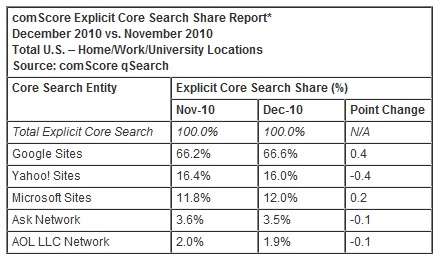ComScore recently released its search-engine rankings and to little surprise, Yahoo slipped yet again. At the beginning of October, Yahoo had pinned about 16.5 percent of the market, which slid to 16.4 the next month. Now, the report says at least measure, Yahoo claims 16 percent.
Yahoo has had its share of well-documented challenges, and recently slashing its staff as well as cutting popular properties under its domain. And now, its core feature is also struggling.
Back in October, Yahoo began using Bing to power its own search engine as well as its ad sales. In exchange, Bing receives 12 percent of Yahoo’s search revenue. Seems like a deal that has primarily benefited Bing.
To no surprise, Google continues to dominant search, and Microsoft’s Bing has made an impressive showing as of late. Check out comScore’s data below for a closer look at the recent results.



